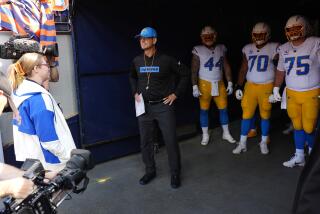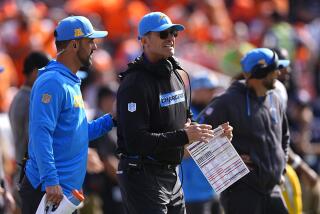Health scares put stress levels of NFL coaches in spotlight
- Share via
One NFL coach falls ill on the golf course, and is undergoing open-heart surgery two days later. Another drops to his knees walking to the locker room at halftime of a nationally televised game, suffering what is later diagnosed as a mini-stroke.
In a league that reports on the health of players on a daily basis, the health of coaches largely has been an afterthought. But after a weekend in which Denver’s John Fox and Houston’s Gary Kubiak suffered disturbing health scares, the intense pressure of their jobs has come under sharper scrutiny.
That stress is not unique to football coaches, of course. They aren’t saving lives or doing back-breaking labor, nor do their careers depend on a fluctuating stock price. But they have pressures, ones that entail spending virtually every waking moment preparing for the next opponent, spending untold hours at team headquarters, and ultimately being publicly judged entirely on a final score each week.
“I don’t say, ‘Hey, it could happen to anybody,’ because I understand what’s going on, because I do it,” Philadelphia Coach Chip Kelly said. “I also know that there’s a lot of people that have stressful jobs. There’s firemen, policemen, doctors. There’s everybody. Whether you’re a football coach or anybody, you should take notice of what happened and just make sure that you can be preventive in what goes on.
“You have to have more balance and take care of yourself.”
Maybe now more than ever, the NFL is filled with head coaches who ostensibly are in good shape. There are exceptions, but for the most part, coaches are relatively trim and athletic.
“We encourage guys to work out during the season, because again it helps you mentally and physically when guys work out,” said Tennessee Titans Coach Mike Munchak, a Hall of Fame guard, speaking about his coaching staff. “It’s important to take care of yourself no matter what your profession is.”
Fox, 58, who felt dizzy on the golf course during the Broncos’ week off, underwent an aortic valve replacement Monday in Charlotte, N.C. He had planned to have the surgery after the season, but doctors acted quickly after his heart scare. He is expected to be out a month or more, and has been replaced in the interim by Jack Del Rio, the team’s defensive coordinator and a former Jacksonville head coach.
Kubiak, 52, was released from a Houston hospital Tuesday, and doctors expect him to make a full recovery, although the team is not putting a timetable on his return. He suffered a transient ischemic attack, a condition that causes stroke symptoms by temporarily stopping blood flow to the brain. Defensive coordinator Wade Phillips — who had head coaching jobs in Buffalo, Denver and Dallas — has taken over as coach in Kubiak’s absence.
“It’s a tough job,” former NFL tackle Tony Boselli said. “It’s tough on your family, because of the hours you work. You’re moving all the time. And then the wins and losses, that’s all that you’re measured by, so your whole existence is around those days. It’s more pressure now than maybe ever because of the existence of talk radio and 24-hour sports stations and the obsession and craze that fans have.
“Heck, I coach offensive line at a high school. If we lose a football game, I’m lying in bed and wake up early the next morning to watch the film. I’m thinking, ‘This is high school football. In the greater scheme of the universe, this means very little.’ So for me, as a stupid, silly offensive line coach in high school, I can’t even imagine what the head coach of the Houston Texans or Denver Broncos is going through.”
There are legendary stories about the pressures of the job, and how a coach can go from solid ground to the hot seat in a few turbulent weeks.
One of the first pieces of advice that future Hall of Fame coach Joe Gibbs received after being hired as an assistant for the St. Louis Cardinals was to watch out for the locksmith’s truck. If it was in the team’s parking lot, somebody was on his way out. The Cardinals changed the locks on coach Jim Hanifan and his staff by halftime of their 1985 season finale.
Sometimes, keeping your job is harder than being shown the door.
“There are times when stress does things to you mentally and physically that nothing else does,” Arizona Coach Bruce Arians said. “I know when I was at Temple my last year, I was having three migraines a week. The day I got fired, I didn’t have another migraine.”
Although the NFL has no specific programs aimed at helping coaches maintain good health, each team has nutritionists, strength and conditioning personnel, and medical staff, giving coaches a distinct advantage over most people outside the league.
In the case of Kubiak’s collapse, he was fortunate to have it happen at an NFL game. According to the National Football League Physicians Society, there are at least 27 medical personnel on the field for a typical game, among them eight trainers, four primary-care physicians, an ophthalmologist, an airway management physician, and even a dentist.
Coaches are paid millions of dollars, and presumably are doing what they love. Still, the career often lacks a sense of perspective.
In a preseason survey of new coaches, Kelly was asked who in football has the hardest job.
“No one,” he wrote. “It is a game.”
Twitter: @LATimesfarmer
More to Read
Go beyond the scoreboard
Get the latest on L.A.'s teams in the daily Sports Report newsletter.
You may occasionally receive promotional content from the Los Angeles Times.










